Goals setting are important to give every aspect of your career or life a sense of direction, gain clarity and understand your motivation.
There are many types of goal-setting techniques and the SMART goal is the most popular amount them all.
Leaders often use the SMART methodology to set personal and professional goals.
SMART is an acronym for Specific, Measurable, Achievable, Relevant, and Timely.
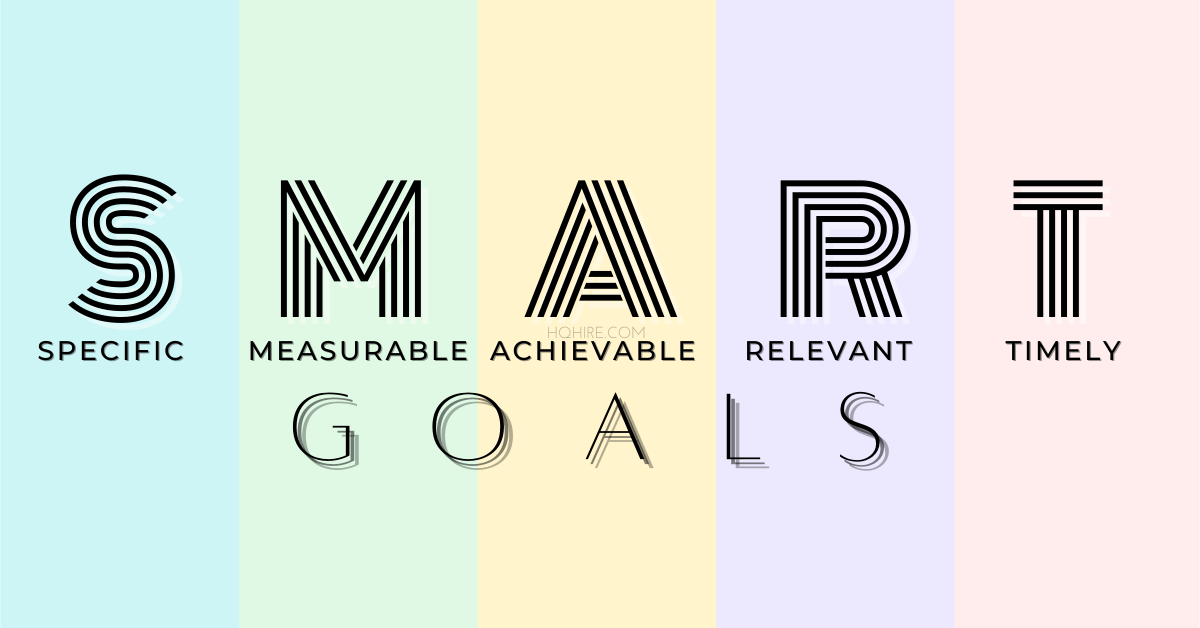
What are the 5 SMART Goals?
A SMART goal is a methodology that increases your chances of reaching your goal by helping you to set a clear and achievable goal.
5 SMART Goals:
- Specific Goals: Clear and define goals.
- Measurable Goals: Specific criteria for measurement.
- Achievable Goals: Not impossible to achieve.
- Relevant Goals: Important to achieve.
- Timely Goals: Clear defined timeline.
Introduced in November 1981 by George T. Doran, he published a paper titled “There’s a S.M.A.R.T. Way to Write Management’s Goals and Objectives”.
All effective goals should incorporate all five elements of SMART.
However, not everything worth achieving is measurable, thus it should also be understood that the suggested acronym doesn’t mean that every goal written will have all five elements.
“SMART Goals is to frame a statement of results to be achieved.”
With these 5 goals in mind, it can guide you to create actionable steps to achieve your goals.
How to write SMART Goals?
When learning how to write SMART goals, you start writing each of the 5 goals with a specific question.
- Specific: What do you want to do?
- Measurable: How do you know you’ve succeeded?
- Achievable: Do you have the power to achieve it?
- Relevant: Is the goal worthwhile for you?
- Timely: When do you want to achieve this?
SMART Goals – Specific
SMART Goals have to be specific to be effective. You’ll need a specific goal to determine your progress and if you are on track to reach your goal. Don’t be afraid to dig into those nitty-gritty details. Ask yourself these questions:
- What do you want to do?
- Who is responsible for it?
- What steps do you want to take to achieve it?
These questions help to prompt you to set a specific goal that lays out the backbone of your goal setting.
Specific Goal Template:
I want to [Goal] by [Actions to be taken].
Specific Goal Example:
I want to reduce my weight by exercising 5 times a week at a local gym near me.
SMART Goals
Specific Goals Example
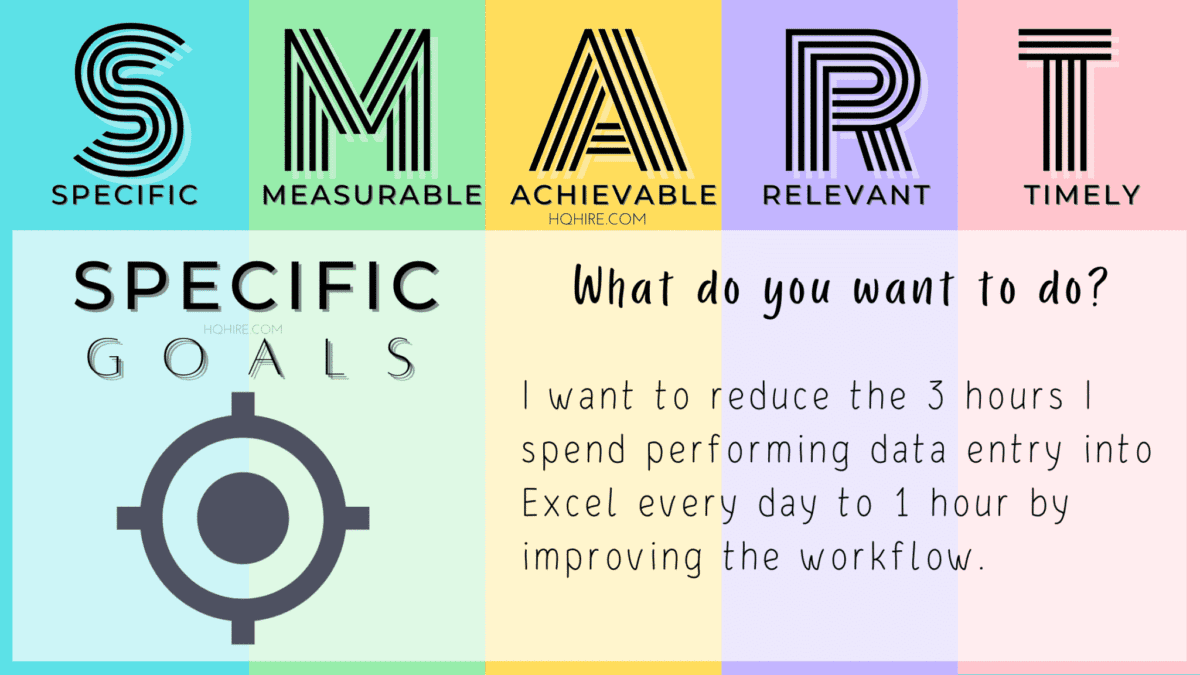
SMART Goals – Measurable
SMART Goals should have criteria for measuring progress. This will help you stay motivated and focus in meeting your deadlines. A measurable goal also helps you to feel the excitement when getting closer to achieving the goal. Ask yourself these questions:
- How do you know you’ve succeeded?
- How much or many?
- What is my indicator of progress?
These questions help to prompt you to set a measurable goal that allows you to monitor your progress and understand when you actually achieved your goal.
Measurable Goal Template:
My goal will be [Short Term Measurable Goal] and I will [Final Measurable Goal].
Measurable Goal Example:
My goal will be to lose one pound per week and I will lose a total of 24 pounds and reduce my weight from 200 pounds to below 180 pounds.
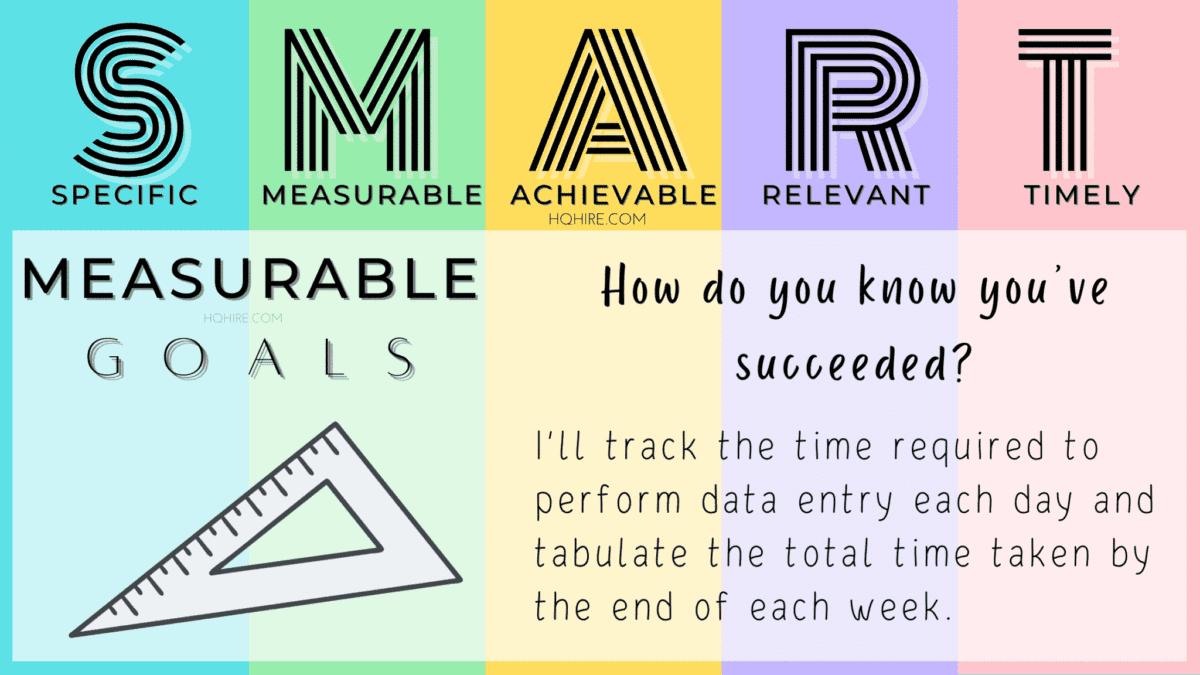
SMART Goals – Achievable
SMART Goals have to be achievable and attainable goals. This will help you to think of ways to help achieve the goal and a plan to work towards it. An achievable goal should stretch your ability to make you feel challenged, but kept well enough that you can achieve it. Ask yourself these questions:
- Do I have the resource or ability to achieve the goal?
- What others have done to help them achieve this similar goal?
- How can I accomplish this goal?
These questions will give you a reality check and help you plan a step-by-step process in achieving your goals.
Achievable Goal Template:
I have [Your Resource or Ability] that provides the capability to [Step You Take To Reach Your Goal].
Achievable Goal Example:
I have many gyms near me that allow me to exercise regularly.
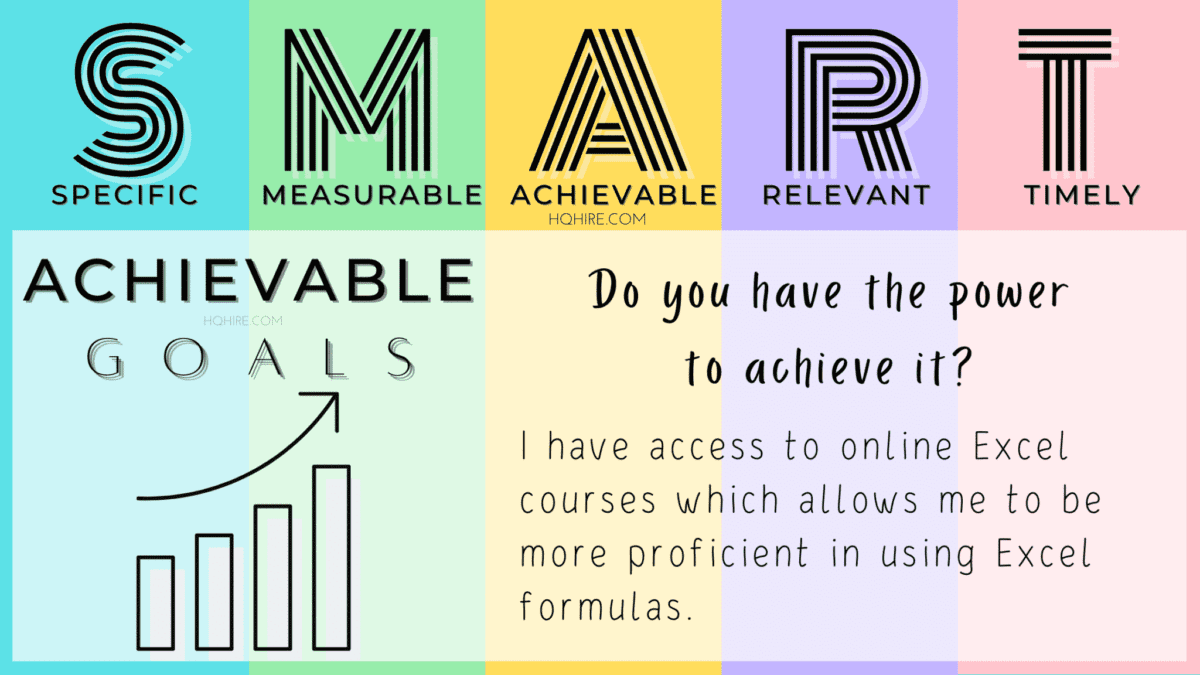
SMART Goals – Relevant
SMART Goals have to be something that matters to you. A relevant goal will help you to stick to your goal whenever you face any challenges. A SMART goal has to be something that interests you in some way or another. Ask yourself these questions:
- Is the goal worthwhile for you?
- Is this the right time?
- Is this worth going to match my needs?
The simple guiding questions will help you to check if the goal really suits your needs.
Simply,
“The smart way of setting goals is to spend time and effort only in achieving a goal that matters to you.”
By A.C.
Relevant Goal Template:
I’ve [The Issue] and [How The Issue Matters to You].
Relevant Goal Example:
I’ve been overweight for the last few years due to a lack of exercise, and the doctor says if this continues, I will be having health issues in the future.
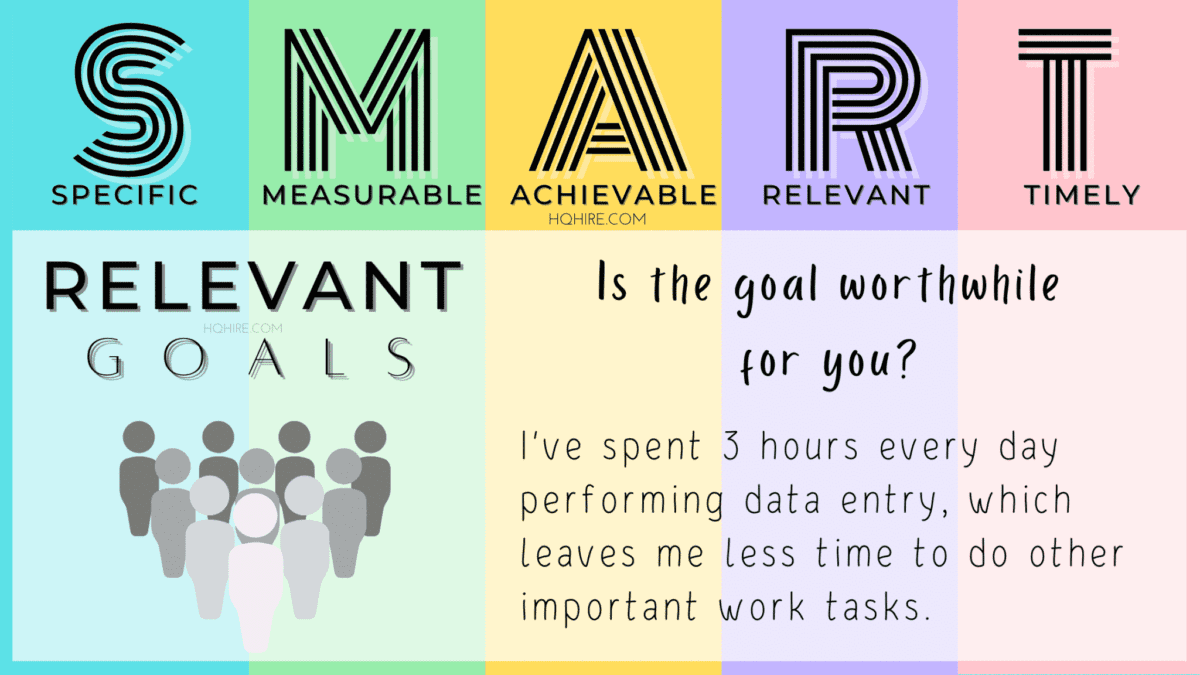
SMART Goals – Timely
The SMART goals must have a start and a finish date. All effective goals need a target date or a deadline. The sense of urgency helps you to get motivated in achieving your goals. The increase in dopamine and endorphins will improve your productivity and thus improve your chance of successfully accomplishing the goal. Ask yourself these questions:
- When do you want to achieve this?
- What can I do in a day?
- What can I do in a week?
- What can I do in a month?
- What can I do in a year?
With the time-related parameters built into your goals, these questions will help you stay on track within a set time frame.
“When there is a when, things get done.”
By A.C.
Timely Goal Template:
I will [Goal + Short Term Timeline] and [Final Goal] by [Specific Deadline].
Timely Goal Example:
I will lose 2 pounds per week and reduce my weight from 200 pounds to 180 pounds by the end of 3 months starting today.
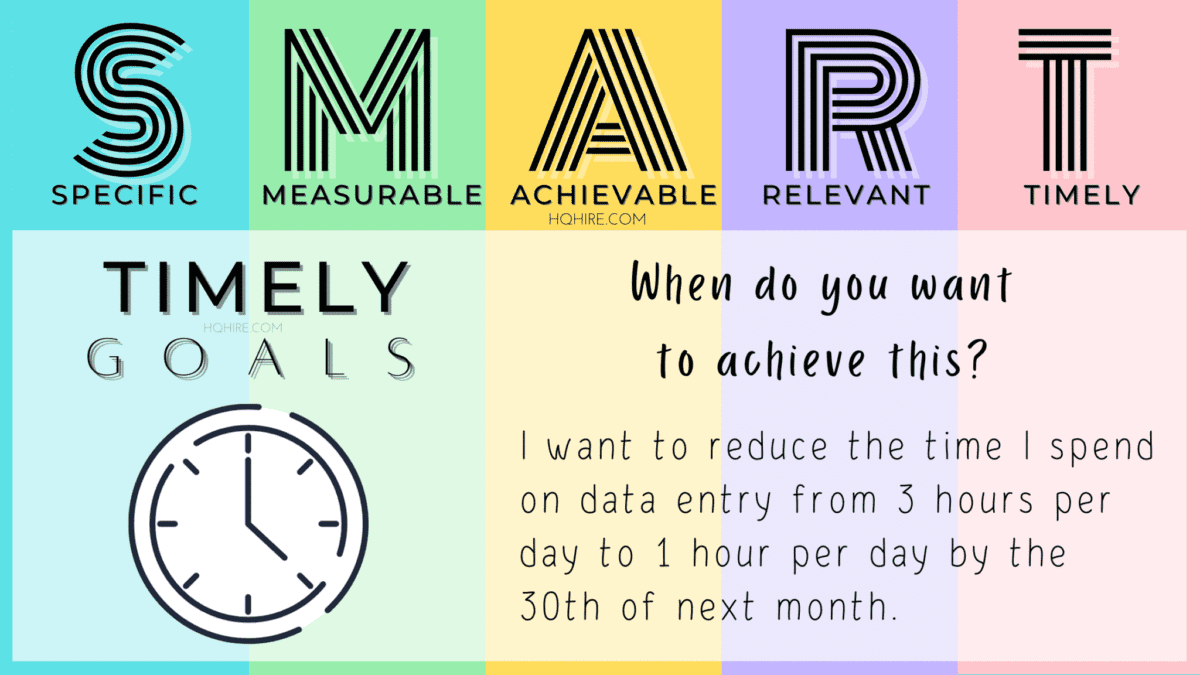
SMART Goals Examples
SMART Goals Examples for Weight Loss
I want to reduce my weight to be healthier by exercising 5 times a week at a local gym near me. My goal will be to lose 2 pounds per week. I will lose a total of 24 pounds and reduce my weight from 200 pounds to below 180 pounds. I will achieve this by the end of 3 months starting today.
SMART Goals Examples for Students
I want to get better grades in a class by studying 2 hours more a day at a local library near me. My goal will be to get from the 20th position to the Top 10 in class. I will achieve this by the end of this year.
SMART Goals Examples for Fresh Graduates or Job Seekers
I want to get a job as a Software engineer by enriching my skill set by attending at least 1 course or seminar per week. I will be sending at least 5 resumes to respective employers each week. My goal will be to get into my dream job in the next 3 months starting today.
SMART Goals Examples for Career Progression
I want to get promoted to an executive position by enriching my management skill and interpersonal skills through managing the project team and attending the toastmaster’s course. I will achieve my goal and progress my career to an executive position in 2 years’ time.
SMART Goals Examples for Project Managers
I want to complete the project successfully by setting up phases to guide the completion of the project. Each phase will be completed in 1 month or less. I will complete the project in 6 months’ time.
What Is Beyond SMART Goals?
SMARTER Goals are beyond SMART Goals. Where the “E” is the acronym for Evaluated goals and “R” is the acronym for Reviewed goals.
Putting all together, SMARTER Goals should be Specific, Measurable, Achievable, Relevant, Timely, Evaluated, and Reviewed.
We think this updated version of the SMARTER Goals will allow elements of feedback and improvements.
Another interpretation by Michael Hyatt argued, that SMARTER Goals should be Excitement and Risk. Excitement will help you to continue pursuing the goal when you encounter unexpected challenges. While risk is what you will use to determine when setting your goal.
But most people choose SMART Goals (5-Steps) methodology during goal setting, instead of SMARTER Goals (7-Steps). Mainly due to ease of execution and simplicity of understanding.
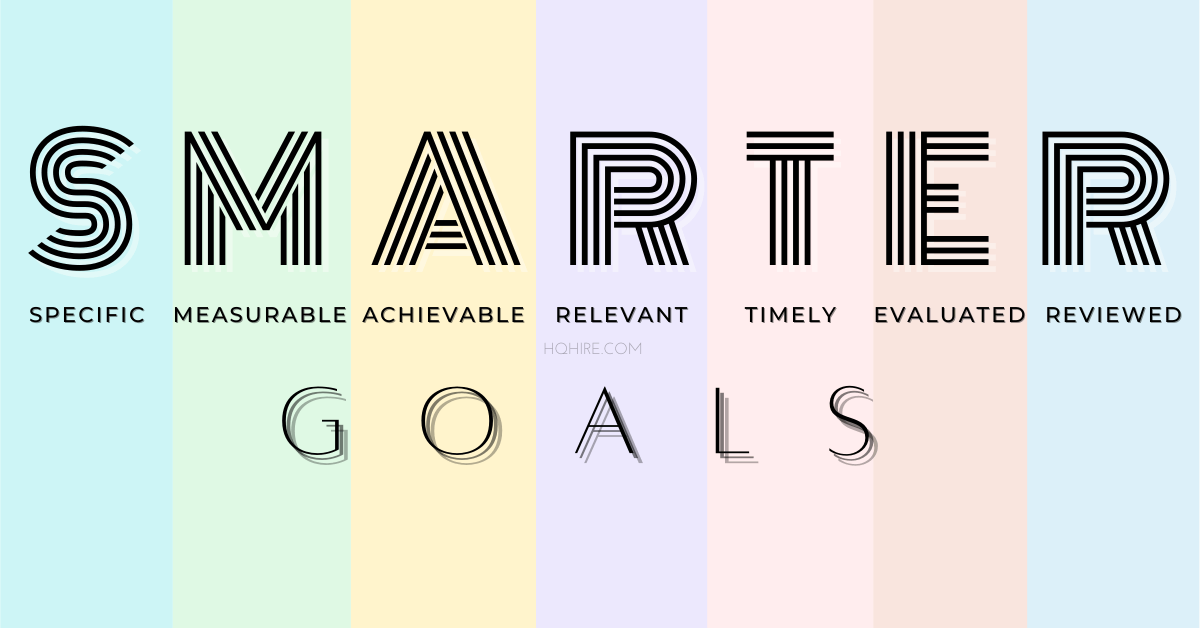
Question
Next time when you are setting your goals, will you use SMART Goals, or SMARTER Goals?
Up Next… What are the important goals you need to achieve in your first year at your new workplace?
Join over 11,000+ achievers who are committed to achieving their career goals!







